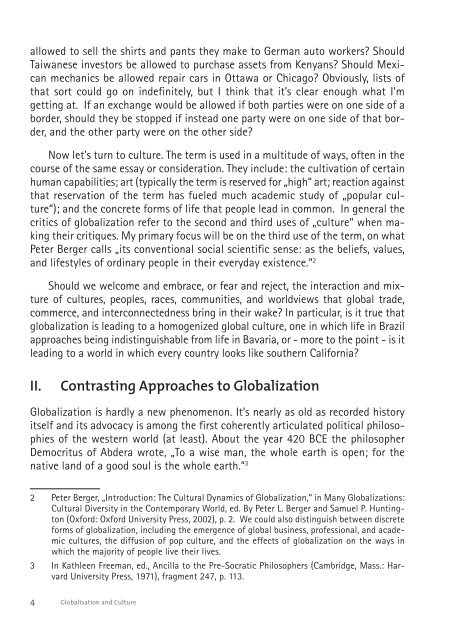Globalization and Culture - Tom G. Palmer
Globalization and Culture - Tom G. Palmer
Globalization and Culture - Tom G. Palmer
You also want an ePaper? Increase the reach of your titles
YUMPU automatically turns print PDFs into web optimized ePapers that Google loves.
allowed to sell the shirts <strong>and</strong> pants they make to German auto workers? Should<br />
Taiwanese investors be allowed to purchase assets from Kenyans? Should Mexican<br />
mechanics be allowed repair cars in Ottawa or Chicago? Obviously, lists of<br />
that sort could go on indefinitely, but I think that it’s clear enough what I’m<br />
getting at. If an exchange would be allowed if both parties were on one side of a<br />
border, should they be stopped if instead one party were on one side of that border,<br />
<strong>and</strong> the other party were on the other side?<br />
Now let’s turn to culture. The term is used in a multitude of ways, often in the<br />
course of the same essay or consideration. They include: the cultivation of certain<br />
human capabilities; art (typically the term is reserved for „high“ art; reaction against<br />
that reservation of the term has fueled much academic study of „popular culture“);<br />
<strong>and</strong> the concrete forms of life that people lead in common. In general the<br />
critics of globalization refer to the second <strong>and</strong> third uses of „culture“ when making<br />
their critiques. My primary focus will be on the third use of the term, on what<br />
Peter Berger calls „its conventional social scientific sense: as the beliefs, values,<br />
<strong>and</strong> lifestyles of ordinary people in their everyday existence.“ 2<br />
Should we welcome <strong>and</strong> embrace, or fear <strong>and</strong> reject, the interaction <strong>and</strong> mixture<br />
of cultures, peoples, races, communities, <strong>and</strong> worldviews that global trade,<br />
commerce, <strong>and</strong> interconnectedness bring in their wake? In particular, is it true that<br />
globalization is leading to a homogenized global culture, one in which life in Brazil<br />
approaches being indistinguishable from life in Bavaria, or - more to the point - is it<br />
leading to a world in which every country looks like southern California?<br />
II.<br />
Contrasting Approaches to <strong>Globalization</strong><br />
<strong>Globalization</strong> is hardly a new phenomenon. It’s nearly as old as recorded history<br />
itself <strong>and</strong> its advocacy is among the first coherently articulated political philosophies<br />
of the western world (at least). About the year 420 BCE the philosopher<br />
Democritus of Abdera wrote, „To a wise man, the whole earth is open; for the<br />
native l<strong>and</strong> of a good soul is the whole earth.“ 3<br />
2 Peter Berger, „Introduction: The Cultural Dynamics of <strong>Globalization</strong>,“ in Many <strong>Globalization</strong>s:<br />
Cultural Diversity in the Contemporary World, ed. By Peter L. Berger <strong>and</strong> Samuel P. Huntington<br />
(Oxford: Oxford University Press, 2002), p. 2. We could also distinguish between discrete<br />
forms of globalization, including the emergence of global business, professional, <strong>and</strong> academic<br />
cultures, the diffusion of pop culture, <strong>and</strong> the effects of globalization on the ways in<br />
which the majority of people live their lives.<br />
3 In Kathleen Freeman, ed., Ancilla to the Pre-Socratic Philosophers (Cambridge, Mass.: Harvard<br />
University Press, 1971), fragment 247, p. 113.<br />
4 Globalisation <strong>and</strong> <strong>Culture</strong>











